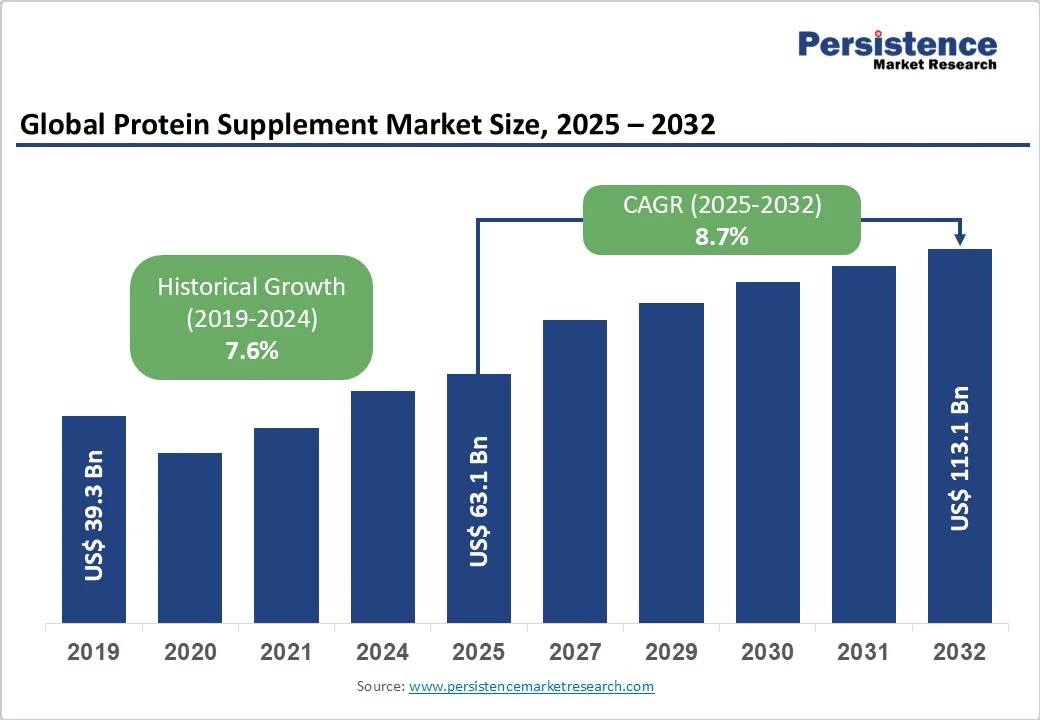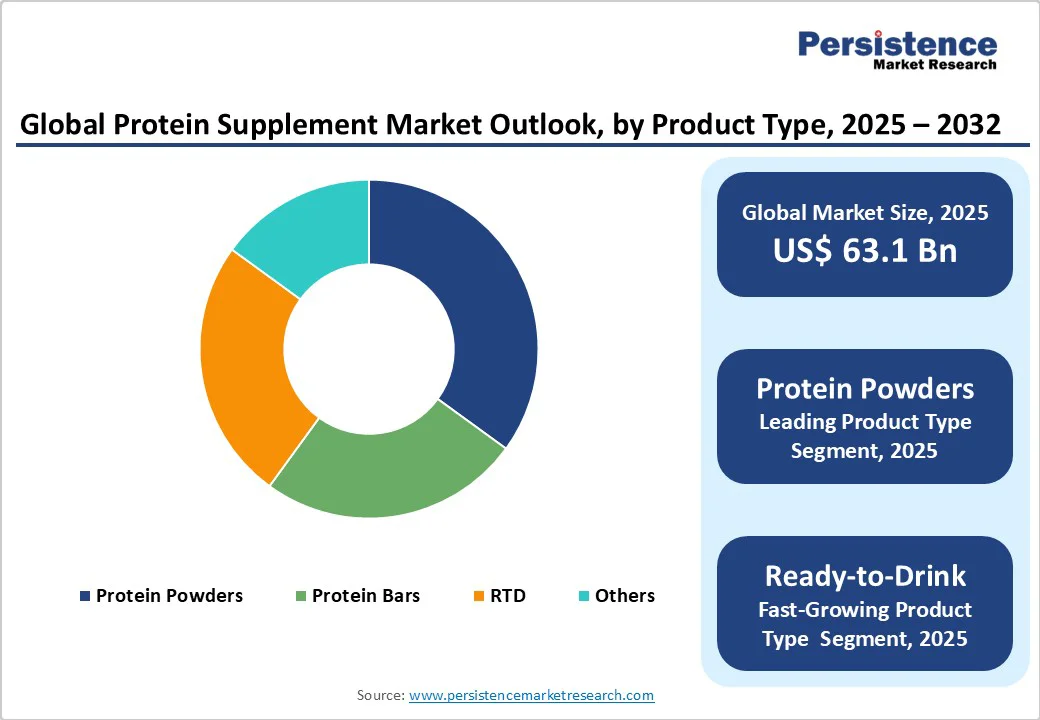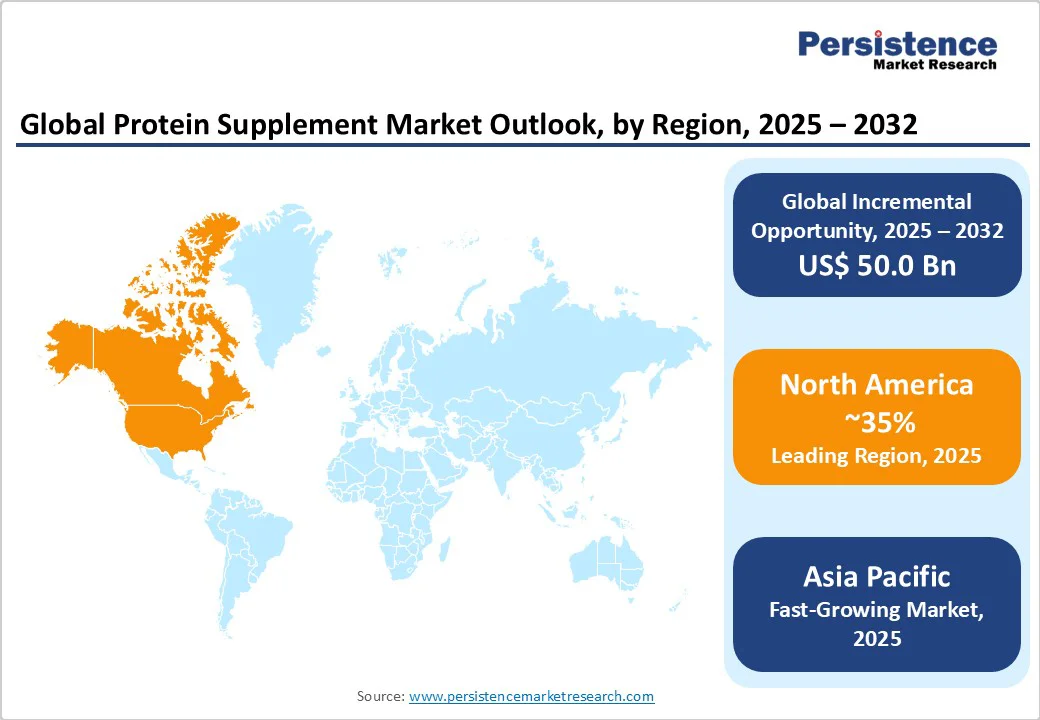ID: PMRREP33774| 196 Pages | 23 Oct 2025 | Format: PDF, Excel, PPT* | Food and Beverages

The global protein supplements market size is likely to be valued at US$ 63.1 Bn in 2025 and expected to reach US$ 113.1 Bn by 2032, growing at a CAGR of 8.7% during the forecast period from 2025 to 2032. The protein supplements market is experiencing rapid growth, driven by increasing health consciousness, rising demand for fitness and wellness products, and the expansion of plant-based alternatives.
Key trends in the protein nutrition market include the shift toward vegan and organic options, innovative formats such as ready-to-drink shakes, and a focus on personalized nutrition. As fitness enthusiasts and health-focused consumers grow, the dietary protein market is evolving with sustainable and functional ingredients, positioning it as a key segment in the global nutraceuticals industry.
| Global Market Attribute | Key Insights |
|---|---|
| Protein Supplements Market Size (2025E) | US$ 63.1 Bn |
| Market Value Forecast (2032F) | US$ 113.1 Bn |
| Projected Growth (CAGR 2025 to 2032) | 8.7% |
| Historical Market Growth (CAGR 2019 to 2024) | 7.6% |

The protein supplements market is witnessing strong growth, primarily fueled by rising health awareness and the global shift toward fitness-oriented lifestyles. With more individuals engaging in regular physical activity, such as gym workouts, yoga, and outdoor sports, the demand for nutritional support that aids in muscle growth, recovery, and endurance is increasing.
Protein supplements are emerging as a convenient solution to meet daily protein requirements, especially for busy consumers who may lack time to prepare protein-rich meals. This growth is further supported by the rising popularity of fitness apps, wellness programs, and online health communities that promote protein intake as part of balanced nutrition.
Additionally, the focus on preventive healthcare is encouraging consumers to adopt supplements that support immunity, energy levels, and overall well-being. The availability of varied formats such as powders, shakes, bars, and ready-to-drink options caters to diverse preferences, making protein supplements more accessible.
As health-conscious millennials and Gen Z drive the fitness culture, the market is expected to expand significantly, supported by innovation, plant-based alternatives, and wider retail availability.
One of the key restraints is the high cost associated with premium products, especially organic, clean-label, or plant-based variants. While these formulations appeal strongly to health-conscious and environmentally aware consumers, their pricing often remains beyond the reach of budget-sensitive buyers, limiting mass adoption.
The production of plant-based proteins, such as pea, hemp, or soy isolates, involves higher processing costs compared to conventional whey or casein, which drives up retail prices. This cost factor creates a barrier in emerging and price-sensitive markets where affordability is a major concern. Furthermore, the market faces challenges linked to supply chain disruptions and raw material sourcing.
Global fluctuations in dairy supply, as well as limited availability of high-quality plant protein sources, can impact both the consistency and pricing of finished products. Issues such as transportation delays, geopolitical tensions, and rising input costs further exacerbate supply chain risks. These constraints not only restrict product availability but also reduce the ability of companies to penetrate new markets, thereby slowing overall industry growth despite rising demand.
A major opportunity is the rapid expansion of plant-based and vegan alternatives, driven by the growing adoption of vegetarian, flexitarian, and vegan diets worldwide. Consumers are increasingly mindful of both personal health and environmental sustainability, creating strong demand for products that are natural, ethically sourced, and free from animal ingredients.
Plant-based protein supplements made from sources such as pea, hemp, rice, or soy not only provide essential amino acids but also align with clean-label and allergen-friendly preferences, making them attractive to a wider consumer base. This trend is reinforced by rising concerns over lactose intolerance and dairy allergies, which are prompting many to shift from whey or casein to non-dairy protein options.
Additionally, manufacturers are focusing on improving taste, texture, and nutritional profiles to match or exceed traditional animal-based proteins, thereby reducing barriers to adoption. By innovating in flavours, ready-to-drink formats, and functional blends, brands can capture environmentally conscious and health-driven consumers, positioning plant-based supplements as a high-growth, future-focused segment within the global protein market.
Animal-based protein sources dominate the supplements market due to their complete amino acid profile, superior digestibility, and proven effectiveness in muscle building and recovery. Whey, casein, and egg proteins remain popular choices among athletes and fitness enthusiasts worldwide.
Plant-based protein sources represent the fastest-growing segment in the supplements market, fueled by rising veganism, flexitarian diets, and increasing sustainability concerns. Derived from peas, soy, hemp, and rice, these proteins offer eco-friendly, allergen-free alternatives while delivering essential amino acids and nutritional benefits comparable to animal-based proteins.
Protein powders dominate the product type segment, favored for their versatility, convenience, and wide range of flavours. Easily blended into shakes, smoothies, or even baking recipes, they provide a simple way for consumers to meet daily protein needs while supporting fitness, recovery, and overall wellness goals.
Ready-to-Drink (RTD) protein products are the fastest-growing segment, driven by their portability, ease of use, and time-saving benefits. Designed for busy, health-conscious consumers, these beverages offer immediate nutrition post-workout or during hectic schedules. With innovative flavours and functional blends, RTDs combine convenience with balanced nutrition, making them highly appealing across diverse consumer groups.
Sports nutrition dominates the application segment, as protein supplements are integral for athletes and fitness enthusiasts aiming to enhance performance, endurance, and muscle recovery. Widely used in pre- and post-workout routines, these products provide essential amino acids, fueling energy, repairing muscles, and supporting strength training, making them a cornerstone of modern athletic and fitness lifestyles.
Functional foods are the fastest-growing application segment, as they integrate protein into everyday products such as snacks, cereals, and baked goods. This approach extends beyond fitness, appealing to health-conscious consumers seeking balanced nutrition, weight management, and immunity support. By blending convenience with wellness, functional foods broaden protein’s appeal across diverse lifestyle and dietary preferences.
Supermarkets lead the distribution channel for protein nutrition, providing consumers with wide accessibility, product variety, and the advantage of in-person shopping. With dedicated health and wellness sections, supermarkets allow customers to compare brands, explore new product formats, and make immediate purchases, driving strong sales and reinforcing their dominance in the retail dietary protein market.
Online channels are the fastest-growing distribution segment in the protein nutrition market, fueled by the convenience of e-commerce, home delivery, and 24/7 availability. Personalized recommendations, subscription services, and direct-to-consumer models enhance consumer engagement, while digital marketing and social media influence purchasing decisions, allowing brands to reach wider audiences and tap into emerging, tech-savvy consumer segments effectively.

North America is projected to hold around 35% of the global protein supplements market in 2025, making it a leading regional player. Growth in the region is driven by a strong fitness culture, high health awareness, and widespread adoption of active lifestyles, with consumers increasingly recognizing protein’s role in muscle building, recovery, and overall wellness.
The United States leads the market, supported by robust e-commerce platforms and direct-to-consumer (DTC) models that provide convenient access to premium products. Online channels, personalized recommendations, and subscription services further enhance consumer engagement and product reach.
Meanwhile, the United Kingdom is experiencing notable market expansion due to rising health consciousness and a growing preference for plant-based and vegan protein options. Sustainability concerns and ethical consumption trends encourage the adoption of non-dairy protein sources.
Additionally, consumers across North America are embracing functional foods and personalized nutrition solutions, reflecting a focus on preventive healthcare and overall well-being. Gym memberships, wellness programs, and lifestyle initiatives continue to support protein supplement consumption, reinforcing North America’s position as a highly influential and innovative market in the global protein supplements landscape.
Europe accounts for approximately 30% of the global protein supplements market, making it a key regional player. Germany and France drive most of this growth, each exhibiting distinct market trends. In Germany, demand is fueled by a strong focus on sports nutrition, with consumers favouring high-quality animal-based proteins such as whey and casein.
The country’s well-established fitness culture, extensive gym networks, and growing awareness of performance enhancement and recovery benefits support consistent consumption of these products, particularly among athletes and fitness enthusiasts who integrate protein into pre- and post-workout routines.
In contrast, France is witnessing significant growth in the plant-based protein segment, reflecting rising adoption of vegan and flexitarian diets. French consumers increasingly prefer clean-label, sustainable, and functional foods that deliver nutritional benefits without animal-derived ingredients.
Additionally, functional foods incorporating protein into everyday meals are gaining traction, broadening consumption beyond traditional fitness-focused users. Together, these trends underscore Europe’s strategic importance in the global protein nutrition market, driven by a combination of performance-oriented and health-conscious consumer behaviours.
Asia Pacific is emerging as one of the fastest-growing regions, accounting a 25% market share. Growth in the region is driven by rising health awareness, urbanization, and shifting lifestyles that prioritize fitness and wellness. China leads the market, with urban populations increasingly engaging in gym routines, sports activities, and wellness programs.
The growing recognition of protein’s benefits for muscle building, recovery, and overall health is driving strong demand for protein powders, especially in the sports nutrition segment. Convenient formats such as ready-to-drink products and functional blends are also gaining popularity among consumers with active lifestyles.
In India, market expansion is fueled by rising disposable incomes, an expanding middle class, and heightened health consciousness. Awareness of preventive healthcare and balanced nutrition is encouraging protein supplement adoption, particularly among young adults and working professionals.
Plant-based protein options are becoming increasingly popular due to dietary preferences, lactose intolerance, and sustainability concerns. Collectively, China and India are positioning Asia Pacific as a high-growth region, with innovation, convenience, and health trends driving sustained market demand.

The global protein supplements market is highly competitive, characterized by rapid innovation and diverse product offerings to meet evolving consumer demands. Leading companies are focusing on developing plant-based, vegan, and functional protein variants, catering to the growing segments of health-conscious, environmentally aware, and allergen-sensitive consumers.
Significant investments in research and development are enabling brands to produce clean-label, high-quality formulations that combine nutrition with taste and convenience. In addition to product innovation, firms are leveraging e-commerce platforms and direct-to-consumer (DTC) models to expand reach, enhance accessibility, and engage consumers through personalized recommendations and subscription services.
Marketing strategies increasingly include collaborations with fitness influencers, wellness experts, and gyms to strengthen brand visibility and credibility within target audiences. Strategic acquisitions and partnerships further consolidate market presence, allowing companies to broaden their product portfolios and enter new geographic markets efficiently.
Sustainability remains a critical focus, with firms sourcing ethically produced ingredients and adopting eco-friendly packaging to appeal to environmentally conscious consumers.
The global protein supplements market is projected to reach US$ 63.1 Bn in 2025.
Key drivers include health consciousness and fitness culture. Consumers seek convenient nutrition for muscle building and recovery.
The market is expected to grow at a CAGR of 8.7% from 2025 to 2032.
Opportunities in plant-based supplements for vegan consumers. Functional foods offer growth in everyday nutrition.
Key players include NOW Foods and Glanbia, leading with innovative formulations and expansions.
| Report Attribute | Details |
|---|---|
| Historical Data/Actuals | 2019 - 2024 |
| Forecast Period | 2025 - 2032 |
| Market Analysis | Value: US$ Bn, Volume: As Applicable |
| Geographical Coverage |
|
| Segmental Coverage |
|
| Competitive Analysis |
|
| Report Highlights |
|
By Source
By Product Type
By Application
By Distribution Channel
By Region
Delivery Timelines
For more information on this report and its delivery timelines please get in touch with our sales team.
About Author